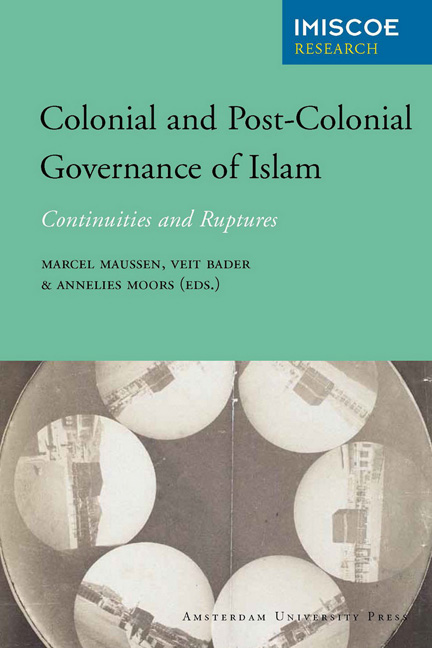1 - Introduction
Published online by Cambridge University Press: 05 February 2021
Summary
The particular position of Muslims and the special status of Islam
There is a renewed interest for the ways in which imperial encounters have shaped the development of Islam and for the various legacies of colonial rule. This volume explores configurations of opportunities and constraints for Muslim life in colonial societies and in post-colonial contexts in Africa, Asia, the Middle East and Europe. Western European societies are post-colonial because they have accommodated large numbers of immigrants from countries they once colonised and because imperialism is a part of their cultural and political history.
Over the past decades, a growing interest has developed for all kinds of aspects of regulation or governance of Islam. If we focus on the discussion about colonial and post-colonial situations, we can demarcate three scholarly fields. A first field of study is the history of colonialism. There is a growing interest within colonial history for the cultural dimensions of imperialism and for the law and legal systems of domination. Several studies focus particularly on the ways imperial rule structured cultural, religious and family life in Muslim societies. One line of interest involves the configurations that emerged when positions of religious authority as well as religious education and training were being shaped in political contexts set by imperial goals and local power configurations (McDougall 2010; Jeppie this volume). Other studies focus on the role of colonialism in the emergence and developmentof modernisation movements in Islam and Islamic reformism in the late nineteenth century. By way of illustration of recent studies on French colonial governance of Islam, we mention the volume edited by Luizard (2006), which explores aspects of French colonial policies in the Muslim world and the monograph on French Muslim policy by Le Pautremat (2003).
A second field concerns research on the legacies of colonial forms of governance in post-colonial societies, especially in Africa and Asia. Such legacies take on a wide variety of forms. They include how particular colonial legacies shaped the relationships between customary law, state law and Islamic law. They touch upon matters of content and competing legal claims, for example in the case of property rights.
- Type
- Chapter
- Information
- Colonial and Post-Colonial Governance of IslamContinuities and Ruptures, pp. 9 - 26Publisher: Amsterdam University PressPrint publication year: 2012
- 1
- Cited by

